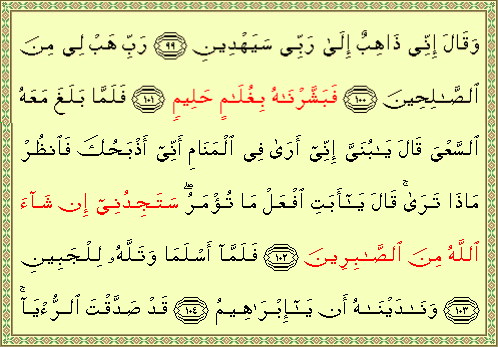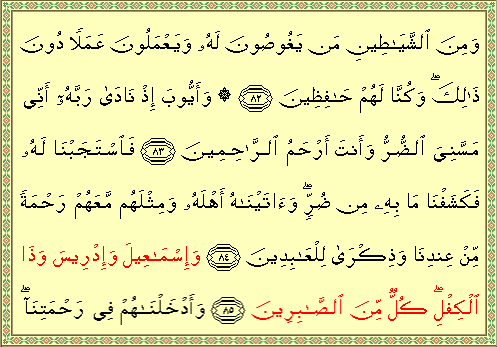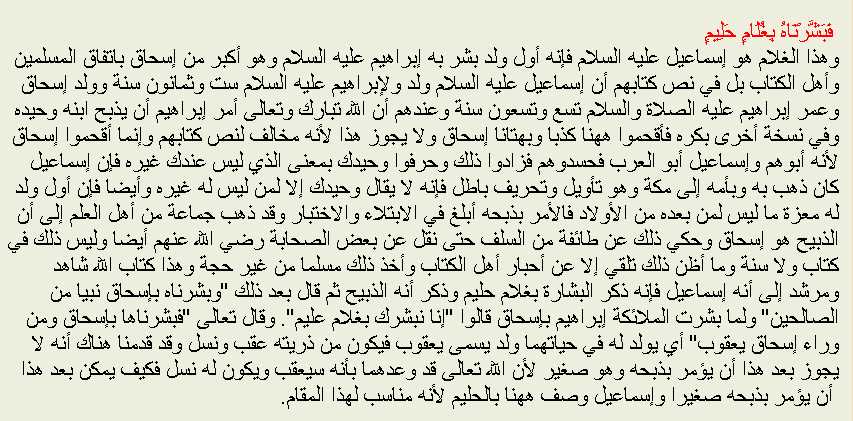The Sacrifice Of Abraham:
Isaac or Ishmael(P)?
Muhammad Ghoniem & M S M Saifullah
© Islamic
Awareness, All Rights Reserved.
Assalamu-alaikum wa rahamatullahi wa barakatuhu:
It is well known to Muslims, Christians and Jews that Abraham(P) was ordered to sacrifice his son and he was willing to do so but God gave him a sheep to sacrifice instead of his cherished progeny. So far, everybody agrees. However, Jews and Christians say that the sacrificed was Isaac(P) -"Abraham's only son", whereas according to the Islamic tradition the sacrificed is Ishmael(P). The opposition between the two versions has not bothered any side that much because in the common mind "what we think is certainly right and those who think differently are necessarily wrong". Recently, we came across an article by the Christian missionaries claiming that according to the Islamic sources themselves the sacrificed was Isaac(P) (i.e., the Judeo-Christian version of the story). In the following article, the reader will get the fruits of our research about this matter.
The most relevant passage in the Qur'ân is from verse 37:99 to verse 37:109, a passage including two different glad tidings brought to Abraham(P). Here under, we quote the verses concerning the sacrificed:

99. He said: "I will go to my Lord! He will surely guide me
100. "O my Lord! Grant me a righteous (son)!"
101. So We gave him the good news of a forbearing son.
102. Then, when (the son) reached (the age of) (serious) work with him, he said: "O my son! I have seen in a vision that I offer thee in sacrifice: now see what is thy view!" (The son) said: "O my father! Do as thou art commanded: thou will find me, if Allah so wills, one of the steadfast!"
103. So when they had both submitted (to Allah), and he had laid him prostrate on his forehead (for sacrifice),
104. We called out to him "O Abraham! ...
105. "Thou hast already fulfilled the vision!" - thus indeed do We reward those who do right.
A Strange Logic
The first argument put forward by those who support the Isaac-theory is that, in the Qur'ân, the name associated to glad tidings is Isaac(P) while Ishmael's(P) name was never associated to good news or glad tidings. They quote verse 37:112
"And We gave him the good news of Isaac - a Prophet - one of the righteous."
and verse 51:28
"They said, "Fear not," and they gave him glad tidings of a son endowed with knowledge."
Some points have to be made clear in this concern:
- It is well known that Abraham(P)
got his first child in his old days (more than 80 years old). By all means, when
he was given the news of his first son, Ishmael(P), the
news were great and not only good. It seems reasonable to think that the news of
having his second son, Isaac(P) would
be equal or less because in the first time the surprise factor has certainly
increased his happiness.
- More to the point, using the same argument as
the opposition, one can safely say that the sacrificed was described as
forbearing and steadfast in the Qur'ân and if we search the whole Qur'ân we will
find the name of Ishmael(P)
associated to patience and steadfastness and not Isaac(P)!
- Indeed verse 21:85 (in red in the picture below) reads
"And (remember) Ishmael, Idris, and Zulkifl, all (men) of constancy and patience".
Conclusion: The sacrificed is Ishmael(P) according to the opponent's own logic.

Further scrutiny requires that we quote the full passage in surah 37:
99. He said: "I will go to my Lord! He will surely guide me!
100. "O my Lord! Grant me a righteous (son)!"
101. So We gave him the good news of a forbearing son.
102. Then, when (the son) reached (the age of) (serious) work with him, he said: "O my son! I have seen in a vision that I offer thee in sacrifice: now see what is thy view!" (The son) said: "O my father! Do as thou art commanded: thou will find me, if Allah so wills, one of the steadfast!"
103. So when they had both submitted (to Allah), and he had laid him prostrate on his forehead (for sacrifice),
104. We called out to him "O Abraham! ...
105. "Thou hast already fulfilled the vision!" - thus indeed do We reward those who do right.
106. For this was a clear trial-
107. And We ransomed him with a momentous sacrifice:
108. And We left for him among generations (to come) in later times:
109. "Peace and salutation to Abraham!"
110. Thus indeed do We reward those who do right.
111. For he was one of Our believing Servants.
112. And We gave him the good news of Isaac - a prophet,- one of the Righteous.
113. We blessed him and Isaac: but of their progeny are (some) that do right, and (some) that obviously do wrong, to themselves.
It is very obvious that, in this passage, there are two distinct good news, the first one about a forbearing son (the one to be sacrificed) and the second one about Isaac(P). Thus, the sacrificed cannot be Isaac(P) at least not according to the Qur'ân. But, once again, the opponent avoided (willingly?) to quote the full passage and this is frequently their way of doing things. Moreover, those who support that the two news are actually the same show their incompetence with the Qur'ânic style. Such a repetition cannot be imagined nor accepted by anyone who studied the Qur'ân, God's Final Book.
The Opinion Of Ibn Kathîr[1]

The above scan is the exegesis of verse 37:101 "So We gave him the good news of a forbearing son". Here is the translation of the above passage:
"So We gave him the good news of a forbearing son."And this son is Ishmael(P) for he is the first son whose good news was brought to Abraham(P). He is older than Isaac according to Muslims and ahl al-kitâb (i.e., the People of the Book) too. It is even said in their Scripture that Ishmael(P) was born when Abraham(P) was 86 years old and Isaac(P) was born when Abraham(P) was 99. In their Scripture as well, God is said to have ordered Abraham(P) to sacrifice his only son and in another version his firstborn. And, at this spot, they inserted falsely the name of Isaac(P) against the text of their very Scripture. The reason they inserted Isaac(P) is that he is their father whereas Ishmael(P) is the father of the Arabs. They added Isaac(P) out of envy and brushed away "only son" by saying that Ishmael(P) and his mother had already been to Makkah. This is a mere [farfetched] explanation since we never say "only son" except to a person who hasn't got but one son. Moreover, the firstborn has got a special place [in the heart of his father] that is not given to the following children and the order to sacrifice him is therefore a greater test. Some knowledgeable people were inclined to say that the sacrificed was Isaac(P). This was reported from some people of the salaf (i.e. people of the previous generations) and it was even reported from some Companions(R) but [this opinion] does not have any bearings from the Book [i.e., the Qur'ân] nor from the Sunnah. I think such opinion was received from the Rabbis of ahl al-Kitâb as is without evidence. Moreover, God's Book is a witness and points to the fact that it is Ishmael(P) because the glad tiding said that the son was patient and that he is the sacrificed. Only afterwards, He said: "And We gave him the good news of Isaac - a prophet,- one of the Righteous." and when the Angels brought the good news of Isaac(P) to Abraham(P) they said: " "Fear not," and they gave him glad tidings of a son endowed with knowledge." And the Most High said: " We gave her [Sarah] glad tidings of Isaac, and after him, of Jacob." [11:71] meaning that in the lifetime of Abraham(P) and Sarah(P), Isaac(P) will beget a child that he will call Jacob(P) implying that Isaac(P) will have a progeny. We have already explained why it is not possible that Isaac(P) be sacrificed while still a child i.e., because God promised them [Abraham and Sarah] that he will have a progeny. On the other hand, Ishmael(P) was described as forbearing and he fits that description.
[Note that many commentators including Ibn Kathîr believe that "forbearing" does not fit a child, it can at least describe teenagers for they are old enough to be described as such.]
In a nutshell, the great Qur'ânic commentator Ibn Kathîr adds to our first three arguments two new ones: according to the Bible, the sacrificed is said to be Abraham's(P) only son (or his firstborn in some versions), which cannot fit Isaac(P); according to the Qur'ân, the good news of Isaac(P) said that he would have a progeny and consequently God cannot order Abraham(P) to sacrifice Isaac(P) before the promise is fulfilled. Again, according to the Qur'ân, the sacrificed cannot be Isaac.
The Opinion of cUlûm al-Hadîth
As a matter of fact, there was a debate between Muslim scholars whether the sacrificed was Isaac(P) or Ishmael(P). But the critical study of the reports allows us to drive safe conclusions. Here is the opinion of a scholar of the Science of Hadîth:
The truth is that the reports stating that the Sacrificed is Isaac are part of the Isrâ'îliyyât due to the People of the Book, it was transmitted by those who converted among them like Kacb al-Ahbâr and it was conveyed [from the converts] by some Companions and Followers [tâbicûn] as sign of trust. Later, the scholars who came after them were fooled by such reports and supported that the Sacrificed was Isaac(P). Every book of exegesis [tafsîr] or biography or even history would mention the argument that took place among the salaf. However, some [of those books] would follow the argument by outlining the truth and others wouldn't add any commentary either by conviction or surrender [to these reports].[2]
And further:
The truth is that the Sacrificed is Ishmael(P). This is supported by the Qur'ânic verses and reports from the Companions and Followers and reports rated Marfuc by approval of the Prophet [i.e., when something is said in the presence of the Prophet(P) and he does not oppose it then we consider that it is correct but it does not amount to Sahîh which is, by the way, what the Prophet(P) himself said.].
No wonder that many Companions and Followers and the later scholars of [Qur'ân] and hadîth among which we enumerate great Companions and poles of knowledge like: cAlî, Ibn cUmar, Abû Hurayrah, Abû Tufayl, Sacîd Ibn Jubayr, Mujâhid, al-Sha'by, Al-Hasan al-Basri, Muhammad Ibn Kacb al-Qardhy, Sacîd Ibn al-Musayyab, Abû Jacfar Muhammad al-Bâqir, Abû Sâlih, al-Rabî' Ibn Anas, Abû cAmr Ibn al-cAlâ' and Ahmad Ibn Hanbal and others and it is one version and the strongest from the reports of Ibn cAbbâs.
In Zâd al-Ma'âd by Ibn al-Qayyim: It is the correct opinion according to the knowledgeable among the Companions and Followers and later generations. This opinions was famous among the Arabs before the advent of Islam and it was transmitted from generation to generation in tawâtur and it was also mentioned in the poetry of Umayyah Ibn Abî al-Salt.[3]
The Opinion Of Judeo-Christian Scholars & Islamic Viewpoint
The Encyclopaedia Judaica says:
In the tale of binding (surah 37:99-110) Muhammad identified the son who was to be sacrificed as Ishmael and, indeed, the opinion of the traditionalists were also divided on this subject. It is related that a renowned traditionalist of Jewish origin, from the Qurayza tribe, and another Jewish scholar, who converted to Islam, told that Caliph Omar Ibn cAbd al-cAzîz (717-20) that the Jews were well informed that Ismail was the one who was bound, but that they concealed this out of jealousy. The Muslim legend also adds details of Hajar (Hagar), the mother of Ismail. After Abraham drove her and her son out, she wandered between the hills of al-Safa and al-Marwa (in the vicinity of Mecca) in search for water. At that time the waters of the spring Zemzem began to flow. Her acts became the basis for the hallowed custom of Muslims during the Hajj.[4]
The testimony of the former Jew as mentioned hadîth literature as quoted in the Encyclopaedia Judaica reads:
Another proof of our speech [i.e., that sacrificed was Ishmael(P)] is reported by Ibn Ishâq: "Muhammad Ibn Ka'b narrated that cUmar Ibn cAbd al-cAzîz sent for a man who had been a Jew then converted to Islam and showed signs of true Islam. [Before his conversion], he was one of their scholars [i.e., he was a Jewish scholar] So he [i.e., cUmar] asked him: which son did Abraham(P) sacrifice? He replied: 'It is Ishmael(P). By God, O Commander of the Believers, the Jews know that but they envy you - the Arabs.'[5]
The Oxford Companion To The Bible echoes the same position as the Encyclopaedia Judaica.
In Muslim tradition, the Arabs trace their ancestry back to Abraham through Ishmael. Because Ishmael was circumcised (Gen. 17:25), so are most Muslims. And, analogous to Paul's reversal of the figures of Isaac and Ishmael (Gal. 4:24-26), Muslim tradition makes Ishmael rather than Isaac the son Abraham was commanded to sacrifice.[6]
It is quite clear from the statement of Judeo-Christian scholars what the Muslim position is about the person who was sacrificed by Abraham(P).
Further Evidence From Hadîth Literature
The following says:
Some reports and traditions from the Companions and Followers state that the Sacrificed is Ishmael(P). Narrated by al-Hâkim in Al-Mustadrak, and Ibn Jarîr [at-Tabarî] in his commentary with its isnâd, and others that cAbdullâh Ibn Sacîd al-Sâbihy said: "We were at Mu'âwiyah's reception and the people started discussing [the story of] Ishmael and Isaac(P) and which one was the sacrificed. Some said Ishmael and some said Isaac(P). Mu'âwiyah said: I am the expert you need; We were at the Prophet's(P) when a bedouin came to him saying "O Prophet of God, I have left the pasture dry and the life hard, the children died and the wealth is gone, so give me [something] of what God has bestowed on you, O Son of the two sacrificed." The Prophet(P) smiled and did not blame/criticize what he said. The people asked: Who are the two sacrificed O Commander of the believers? He replied: When cAbdul Muttalib was ordered to dig Zamzam he vowed to sacrifice one of his sons if God helps him with his mission [i.e., Zamzam]. When he achieved the mission, he cast lots on his children, there were ten of them. The choice fell on cAbdullâh so he decided to sacrifice him but the child's uncles, Banu Makhzûm, opposed the sacrifice and said satisfy your Lord and ransom your son. So, he ransomed him with a hundred camels. Mu'âwiyah said: this is one [of the two Sacrificed] the other is Ishmael(P)."
This report is regarded as Marfuc.[6]
There is another report according to which the Prophet(P) is believed to have said: "I am the son of the two Sacrificed". The authenticity of this report is very controversial so we will not use it as evidence especially when the above report is correct enough and suffices to our study.
Conclusion
According to the Qur'ân, the sacrificed cannot be Isaac(P). According to authentic Islamic tradition, the sacrificed is Ishmael(P). The Muslim scholars have solved this case a long time ago and, very early in the history of Islam, the popular Islamic tradition has integrated the fact that Ishmael(P) was the sacrificed.
Concerning the claim of 'world-renowned commentary of Yusuf Ali', any Muslim with a basic knowledge of Qur'ânic commentary would have a good laugh. The 'commentary' in the translation of the Qur'ân by Yusuf cAlî is just about good enough to be qualified as 'footnotes'. And of course, the commentary on the Qur'ân contains much more than these footnotes. Secondly, the statement
It is obvious that the claim that the son was Ishmael is not according to the Qur'ân!
is a rather foolish and reflects colossal ignorance on the part of the critic who has no idea about how the Qur'ânic exegesis is carried out.
Let the Christian missionaries study the Qur'ân thoroughly before calling upon ghosts that will frighten nobody but themselves. Indeed, the Biblical version of the story: "sacrifice your only son, Isaac" or "sacrifice your firstborn son, Isaac" is an enigma they must live with.
Praise be to Allah that guided us to Islam and gave us in the Qur'ân healing and guidance.
References
[1] Abul-Fidâ' Ismâcîl Ibn Kathîr ad-Dimishqî, Tafsîr Ibn Kathîr, Available online (requires an Arabic enabled browser).
[2] Dr. Muhammad Ibn Muhammad Abû Shahbah (Professor of Qur'ânic Sciences and Hadîth at al-Azhar and Umm al-Qurâ Universities), Al-Isrâ'iliyyât wal Mawdû'ât fî Kutub at-Tafsîr, Maktabat as-Sunnah (4th edition) - 1408AH/1988, p. 254.
[3] Op. cit., p. 257.
[4] Encyclopaedia Judaica, Volume 9, Encyclopaedia Judaica Jerusalem, pp. 82 (Under 'Ishmael').
[5] Abû al-Fadl Shihâb-uddîn al-Alûsî, Ruh al-Macâni fi Tafsîr al-Qur'ân al-'Adhîm wassab' al-Mathâni, Part 23, p. 135.
[5] Bruce M Metzger & Michael D Coogan (Ed.), Oxford Companion To The Bible, 1993, Oxford University Press, Oxford & New York, pp. 329 (Under 'Ishmael').
[6] Dr. Muhammad Ibn Muhammad Abû Shahbah, Op. cit., p. 259-260.
No comments:
Post a Comment